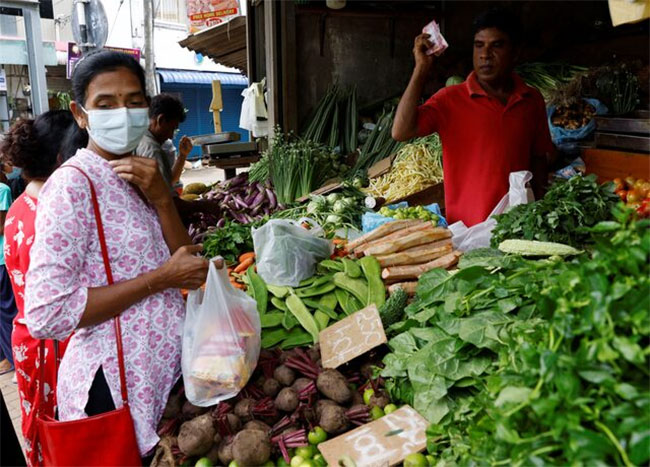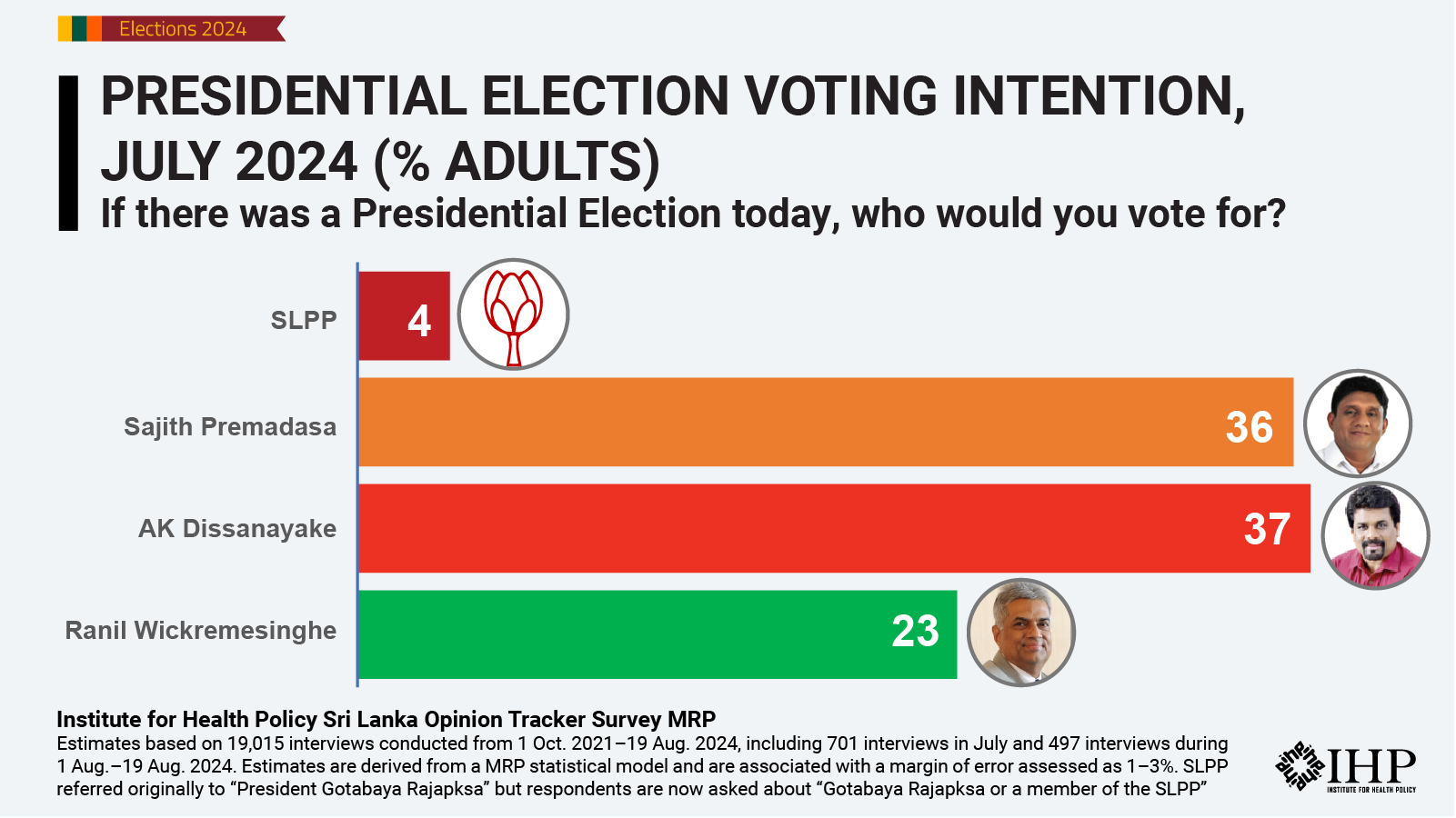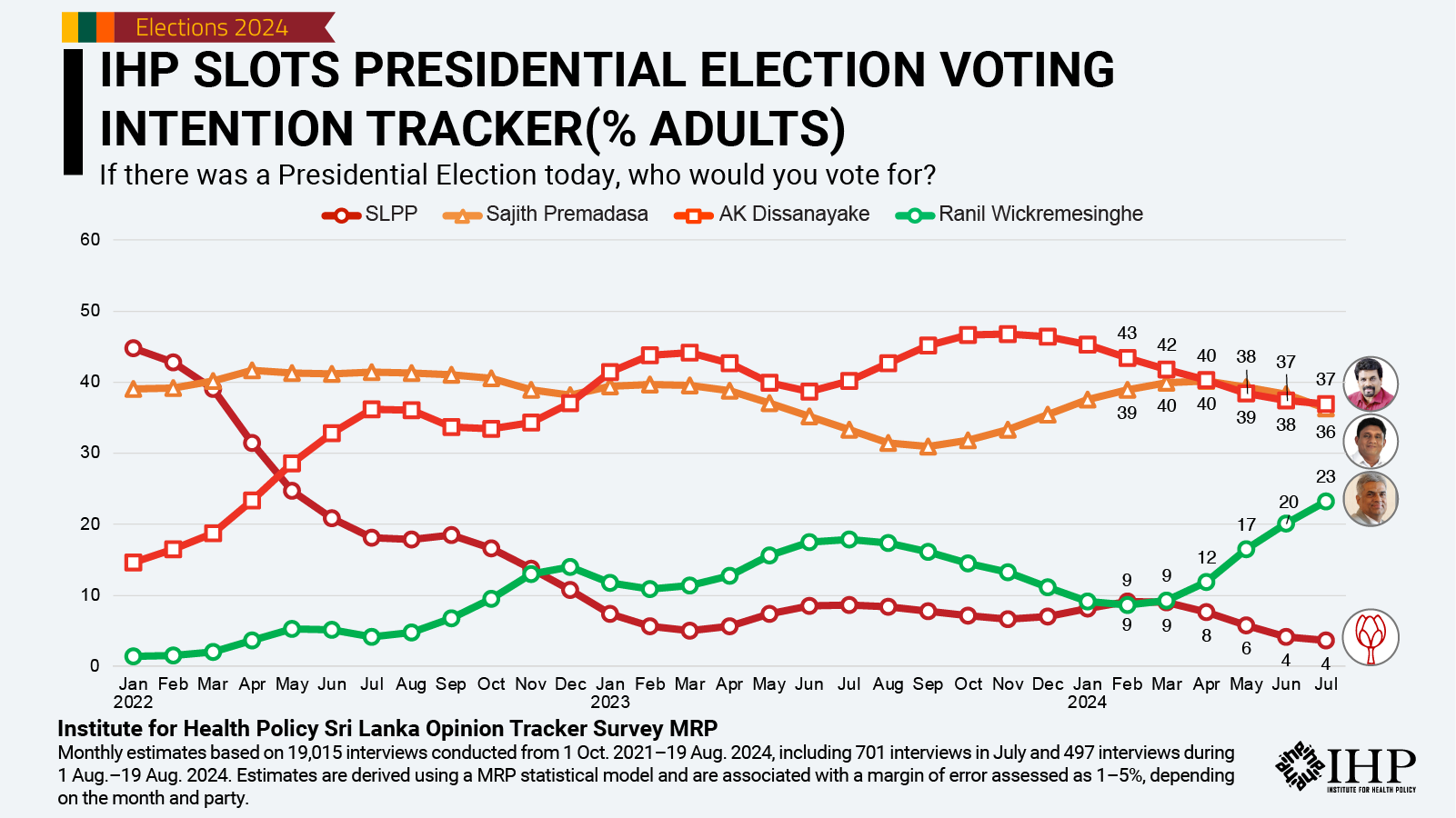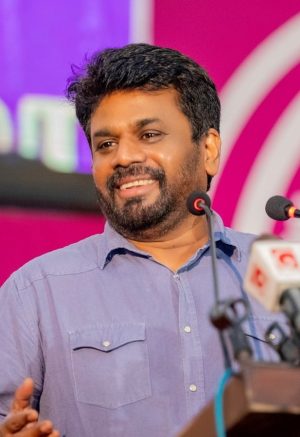කර්තෘ – ජ්යෙෂ්ඨ මාධ්යවේදී ප්රියන්ත ප්රදීප් රණසිංහ
පොතේ නම – තිස්පන් ලක්ෂයක රැකියා සුරැකි ත්රෛපාර්ශවික එකඟතාවය
කර්තෘ – ජ්යෙෂ්ඨ මාධ්යවේදී ප්රියන්ත ප්රදීප් රණසිංහ
ප්රකාශක – දෙසරැස ප්රකාශකයෝ
ජනගත කළ දිනය, ස්ථානය – 2024.08.21, පොත් ප්රකාශයන්ගේ සංගමයේ ශ්රවනාගාරය , බත්තරමුල්ල
පළමු පොත පිළිගැන්වූයේ අග්රාමාත්ය දිනේෂ් ගුණවර්ධන මහතා වෙත
ප්රධාන දේශනය – කම්කරු අමාත්යංශයේ හිටපු ලේකම් මහින්ද මඩිහහේවා මහතා
පොත ගැන හැඳින්වීම
කොරෝනා වසංගත සමයේ මෙරට පෞද්ගලික අංශයේ රැකියා ලක්ෂ 35ක් තර්ජනයට ලක්වූ අවස්ථාවේ, වෘත්තීය සමිති, හාම්පුතුන්, කම්කරු අමාත්යංශය එක්ව ත්රෛපාර්ශවික ගිවිසුමක් හරහා එම සියලු රැකියා සුරක්ෂිත කළ ඓතිහාසික ක්රියාදාමය “තිස්පන් ලක්ෂයක රැකියා සුරැකි ත්රෛපාර්ශවික එකඟතාවය” පොතට විෂය වී ඇති අතර එය ජ්යෙෂ්ඨ මාධ්යවේදී ප්රියන්ත ප්රදීප් රණසිංහගේ පර්යේෂණාත්මක අධ්යයනයක් ලෙස සැලකිය හැකිය. ශ්රමය, පරිපාලනය, නිෂ්පාදනය, ආදී ආර්ථික සාධක මෙන්ම කාර්මික සාමය, කම්කරු නීතිය ආදී විෂයයන් අධ්යයනය කරන්නෙකුට මෙම කෘතියෙන් හෙළිදරව් කරන නිර්මාණාත්මක කාර්යභාරය, අලුත් ආදර්ශය අතිශය ප්රයෝජනවත්ය. ශ්රමිකයා සහ ව්යාපාරිකයා එක්ව ආර්ථිකය ශක්තිමත් කිරීමට මෙම “ත්රෛපාර්ශවික ගිවිසුම”ඉවහල් වූ අකාරය සහ එහි ඇති සර්ව කාලීන ප්රයෝගිකත්වය මෙයින් ඉතා හොඳින් පැහැදිලි කෙරේ.
රට වසාදමා තිබූ පසුබිමක, මෙරට කම්කරු අමාත්යවරයා වූ අග්රාමාත්ය දිනේෂ් ගුණවර්ධන මහතා, සියලු වෘත්තීය සමිති සහ හාම්පුතුන්ගේ සම්මේලනය(ලංකා සේව්ය සම්මේලනය) කැඳවා, ඇඳිරි නීතිය මධ්යයේ අඛණ්ඩව කළ සාකච්ඡාවල විස්තර සහ ඒ සඳහා, අන්තර්ජාතික කම්කරු සංවිධානය(ILO) ඇතුළු අන්තර්ජාතික ප්රජාව ලබාදුන් සහයෝගය මෙන්ම ඔවුන්ගේ ඇගයීම පිළිබඳවද මෙහි කරුණු පෙළගස්වා ඇත. වැදගත් ම දේ වන්නේ 2020 වර්ෂයේ මෙම ත්රෛපාර්ශවික ගිවිසුම උදෙසා වන සාකච්ඡාවලට සජීවීව දායක වූ වෘත්තීය සමිති නායකයන්, හාම්පුතුන්ගේ සම්මේලනයේ ප්රධානින්, කම්කරු අමාත්යංශයේ ඉහළ නිලධාරීන්ගේ සම්මුඛ සාකච්ඡා කිහිපයක්ද, කෘතියට අන්තර්ගත විමය. මෙය දන්නා කතාවක් යළි කීමක් නොව, සැඟව ගිය ඓතිහාසික සිදුවීමක් කරළිය මත තැබීමකි.
එකල ශ්රී ලංකාවේ, ලෝකයේ තත්ත්වයන් සංඛ්යා ලේඛන මූලාශ්ර උපුටමින් කරුණු ඉදිරිපත් කරන කතුවරයා, මෙම අග්රගන්ය ගිවිසුම, මෙරට පමණක් නොව ලෝකයට ම මෙවැනි අත්දැකීමක් වූ පළමු අවස්ථාව බව පවසයි.
අසල්වැසි ඉන්දියාවේ පවා දසලක්ෂ ගණනින් රැකියා අහිමි වෙද්දී, මෙරට පෞද්ගලික අංශයේ කිසිදු රැකියාවක් අහිමිවන්නට නොදී රැකගත් ඒ ඓතිහාසික ගිවිසුම තුළින් ශ්රී ලංකාව ලෝකයට දුන් සහයෝගිතාවයේ අලුත් ආදර්ශය වර්තමානයට මෙන්ම අනාගතය දැනගන්නට සැලැස්වීම කෘතියේ අරමුණ බව පෙනේ. සාමාන්යයෙන් විෂය නොවන කාර්මික සබඳතාවයේ යහපත් භාවිතය පිළිබඳ ලියවුනු මේ පර්යේෂණ ග්රන්ථය, වැඩ ලෝකයේ සියලු හවුල්කරුවන්ට මහඟු සම්පතක් ලෙස සැලකිය හැකිය.
…………….
කම්කරු අමාත්යාංශයේ හිටපු ලේකම් ජාත්යන්තර කම්කරු සංවිධානයේ උපදේශක මහින්ද මඩිහහේවා මහතාගේ දේශනය ……
“කාර්මික සාමය කඩවීම පිළිබඳ බොහෝ සාකච්ඡා, විමර්ශන සිදුවී ඇති නමුත්, අසීරු අවස්ථාවල කාර්මික සාමය ආරක්ෂා කිරීම පිළිබඳ ගැඹුරින් සාකච්ඡා කළ අවස්ථාව විරලයි. එවන් අවස්ථාවක ලියවුනු මෙම වටිනා පොත් පිංච, අගය කළ යුතුයි.ශ්රී ලංකාවේ කම්කරු සම්බන්ධතා පිළිබඳ ලියැවී ඇති මේ පොත් ඉතාම විරලයි. ඉතිහාසයේ අත්දැකීමක් නොතිබූ කොරෝනා වසංගත සමය නැමති අභියෝගාත්මක අවස්ථාවේ එළැඹි අග්රගන්ය ඓතිහාසික සාමූහික ගිවිසුමක් පාදක කරගෙන පරිච්ඡේද හතරකින් සමන්විත මෙම පොත් පිංච දොරට ජනගත කිරීම වෙනුවෙන්, මෙහි කර්තෘ ජ්යෙෂ්ඨ මාධ්යවේදී ප්රියන්ත ප්රදීප් රණසිංහ මහතාට කාගේත් ස්තූතිය හිමි විය යුතුයි.
2020-22 කාලය ගෝලීය වශයෙන් මෙන්ම දේශීය වශයෙන් අප සියලු දෙනාටම මුහුණ පෑමට සිදුවූ අභියෝගාත්මක කාලවකවානුවක් බව අවවාදයෙන් පිළිගත යුතුය. මෙරට ගම් දනව් පුරා කොරෝනා පැතිර යාමත්, 2020 මාර්තු 16 වන දින මුළු රටම lockdown කිරීමත්, ඒ වගේම හදිසි නීතිය පැනවීමත් නිසා, රට බලපතල අර්බුදකාරී තත්ත්වයකට පත් විය.
විශේෂයෙන් ම ශ්රී ලංකාවේ කොරෝනා වසංගතය සෞඛ්ය අර්බුදයකට වඩා, ආර්ථික අර්බුදයක් බවට පත් විය. එවකට හිටපු කම්කරු හා විදේශ කටයුතු අමාත්යවරයා, වර්තමාන අග්රාමාත්යවරයා ඒ අවස්ථාවේ විශේෂ කාර්ය සාධක බලකායක්, ත්රෛපාර්ශවීය නියෝජනය තියෙන කාර්ය සාධක බලකායක් පත් කර, විශේෂයෙන්ම NLAC (ජාතික කම්කරු උපදේශක සභාව) නැත්නම් අපේ කම්කරු අමාත්යංශය යටතේ ත්රෛපාර්ශවීයව නියෝජනය වන එකම සාකච්ඡා මණ්ඩපය ගැටළුව විසඳීම උදෙසා යොදාගනු ලැබිය.
කොරෝනා අවස්ථාවේ රටේ ආර්ථිකයේ බැරෑරුම්කම කතුවරයා හොඳින් පැහැදිලි කර ඇත. ජන ලේඛන හා සංඛ්යා ලේඛන දෙපාර්තමේන්තුව දත්තවලට අනුව 2020 දෙවන කාර්තුව වන විට මෙරට දළ දේශීය නිෂ්පාදනය 16.5% කින් පහළ ගියා. ඒ වගේම රෙදිපිළි හා ඇඟලුම් නිෂ්පාදන කර්මාන්තයට 44.2% කින් පසුබෑමට ලක්වුණා. සේවා අංශය හා ආහාර සැපයුම් අංශය 63% කින්ම අඩුවුණා. සංචාරක කර්මාන්තය මුළුමනින්ම බිඳ වැටුණා. ඒ වගේම 2020 මාර්තු 1 වෙනි වසංගත රැල්ලේ දී 45% ක් සේවයට වාර්තා කළේ නෑ.
සේවකයින්ට වැඩට පැමිණීමට නොහැකි වීම මත හාම්පුතුන්ට තම ආයතනය පවත්වා ගැනීම දුෂ්කර වූ අතර ව්යාපාර හා කර්මාන්ත කරගෙන යාමට නොහැකි තත්ත්වයක් වාර්තා විය.
ජාත්යන්තර හා දේශීය වෙළඳපොළ කඩා වැටුණි. මේ හේතුවෙන් සේවක වැටුපෙන් අඩක්වත් ගෙවීමට නොහැකි බවත්, ප්රකාශ කෙරිණි. මේ අනුව 2020 මැයි වන විට සේවකයින් 65%ක් පමණ සේවය අහිමි වීමේ තර්ජනයකට මුහුණ දුන්නේය. ගෝලීය තත්ත්වය සලකා බලන විට 85% ක් පමණ සේවා ස්ථාන සම්පූර්ණ වශයෙන්ම හෝ අර්ධ වශයෙන් වැසී ගියේය. 2020 මැද භාගය වන විට අසල්වැසි ඉන්දියාවේ ව්යාපාර 50% කට වඩා වැඩි ප්රමාණයක් වසා දැමීමට සිදු වුණි. විරැකියාව 20% බවට පත්විය. වසර 40ක් තුළ දකුණු ආසියානු කලාපයේ ඇතිවූ දරුණුතම ආර්ථික අවපාතයට මෙම රටවල් මුහුණ දුන්නේය.කෘතියේ කතුවරයා මේ තත්ත්වය දේශීය වශයෙන් මෙන්ම ගෝලීය වශයෙන් ද අධ්යයනය කර මනාව විග්රහයක් කර තිබේ.
1923, කම්කරු දෙපාර්තමේන්තුව ආරම්භ කර දශක 10ක්, වසර 100ක් වන අතර, මේ කාලය තුළ කිසිම අමාත්යවරයෙකුට මුහුණ දීමට නොවූ තරම් දැවැන්ත අභියෝගයක මුහුණ දුන්නේ කොරෝනා සමයේ කම්කරු ඇමතිතුමා හැටියට කටයුතු කළ දිනේෂ් ගුණවර්ධන මහතායි. මේ රැකියා සහ ව්යාපාර අර්බුදය සාකච්ඡා කිරීමට ඇමතිවරයා ත්රෛපාර්ශවික නියෝජනයක් ඇති ජාතික කම්කරු උපදේශක සභාව, 2020 මාර්තු 11 වැනි දින රැස්කළේය.කම්කරු දෙපාර්තමේන්තුව ආරම්භ කර ගතවූ වසර 100 කාලය තුළ, වැඩි කාලයක් මම කම්කරු දෙපාර්තමේන්තුවේ කම්කරු නිලධාරියෙක් හැටියටත්, සහකාර කම්කරු කොමසාරිස්වරයෙක් හැටියටත්, නියෝජ්ය කොමසාරිස්වරයෙකු හැටියටත්, කම්කරු අතිරේක කොමසාරිස් ජෙනරාල්වරයෙක් හැටියටත්, කම්කරු කොමසාරිස් ජෙනරාල්වරයා හැටියටත් සේවය කළා. ඒ කාලය තුළ මෙවැනි අවස්ථාවක් මේ අත්දකින්න ලැබුණේ නෑ. වැවිලි ක්ෂේත්රයේ සාමූහිකගිවිසුම් සාකච්ඡා කිරීමේදී ඇතිවන ගැටලු විසඳීමට තමයි අපිට හුඟාක් මුහුණ දෙන්න සිදුවෙන්නේ. මොකද ඒක සාමූහික ගිවිසුමක්. විශේෂයෙන්ම මේ සාමූහික ගිවිසුම් රාශියක්ම ඇති වුණේ අපේ ලංකා සේව්ය සම්මේලනය සහ අපේ බාලාතම්පෝ මහතානායකත්වය දැරූ CMU (ලංකා වෙළඳ සේවක සංගමය) සමගයි.
මීට වසර 35 කට ප්රථම 1989 තමයි කම්කරු අමාත්යාංශය සහ කම්කරු දෙපාර්තමේන්තු නිලධාරීන් කණ්ඩායමක් වෙනත් රටවල ඇති සමාන වෙනත් අනු ආයතන පිළිබඳ අධ්යයනය කරලා කළ යෝජනාවලට අනුව, 1989 දී තමයි ජාතික කම්කරු උපදේශක සභාව(NLAC) ස්ථාපිත කළේ. ජාත්යන්තර කම්කරු සංවිධානයේ(ILO) තාක්ෂණික උපදෙස් අරගෙන, ඒ වගේම අනිත් රටවල NLAC මේ වගේ ජාත්යන්තර උපදේශක සභා පිළිබඳ අධ්යනය කරලා මේ දේ කළේ. පසුව නැවතත් ඒක restructuring process එකකට ගියා. සාමූහික කේවල් කිරීම හොඳම තෝතැන්නක්, මණ්ඩපයක් තමයි NLAC එක. පහුගිය කාලයේ වෘත්තීය සමිති 17 ක් පමණ හිටියා. ඒ වගේම ලංකා සේව්ය සම්මේලනයේ, වාණිජ මණ්ඩල, ඒවගේම BOI වගේ ආයතන, ඒ වගේම සියලුම රාජ්ය නිලධාරීන් එකතු වෙලා තමයි මේ මණ්ඩපය සකස් වන්නේ.
මේ මණ්ඩපයෙන් උපරිම විදියට ප්රයෝජනයට ගත්තේ අග්රාමාත්ය දිනේෂ් ගුණවර්ධන මහතා කම්කරු අමාත්යතුමා හැටියට කෝවිඩ් සමයේ ඇතිකරගත්ත ත්රෛපර්ශවිය ගිවිසුම. මම හිතන්නේ ඒක ඓතිහාසික, ඒ වගේම ඉතාමත්ම වැදගත් ගිවිසුමක් හැටියට අගය කළ හැකියි. කොරෝනා සමයේ, හාම්පුතුන් තම ව්යාපාර කර්මාන්ත අර්බුදයට පත්ව ඇති හෙයින් 1971 අංක 45 දරන සේවය අවසන් කිරීමේ පනත යටතේ සේවකයන් සේවයෙන් ඉවත් කිරීමට ඉල්ලුම් කර සිටියා. මේවගේ අවස්ථාවක් වුනාම සේව්යාගේ පාලනයෙන් තොරව වෙනවා නම්, කම්කරු අමාත්යංශයට, කොමසාරිස්තුමාට ඉල්ලීම් කරන්න පුළුවන් සේවය අවසන් කිරීම ගැන.
ඒක සාධාරණ නම් ඒ පිළිබඳ අධ්යයනය කරල සේවකයින්ට අසාධාරණයක් නොවෙන්න වන්දි ලබා දීලා ඒ වගේ කරනවා. නමුත් අග්රාමාත්යවරයා, පෞද්ගලික අංශයේ ලක්ෂ 37, සේවා නියුක්තියට කිසිම හානියක් නොවන ලෙස කටයුතු කළා. ඒ වගේ කම්කරු දෙපාර්තමේන්තුව මේ සේවය අවසන් කිරීමේ ඉල්ලුම් පත්ර භාර ගන්න එපා කියලා කම්කරු අමාත්යවරයා හැටියට, අග්රාමාත්යතුමා ඒ වෙලාවේ උපදෙස් දීලා තිබ්බා.
මම හිතන්නේ මේ වූ තිස්පන් ලක්ෂයක කම්කරුවන්ගෙන් යැපෙන තවත් පවුල් මිලියන ගණනක් ඉන්නවා. මම හිතන්නේ ජීවනෝපාය ඉතාමත්ම අසීරු තත්ත්වය තියෙන අවස්ථාවක කම්කරු දෙපාර්තමේන්තුව උපදෙස් දීලා මේ සේවකයන් ඉවත් කරන්න එපා කියන නියෝගය ලබා දුන්නා. මෙවැනි අවස්ථාවක සමථයකට පත්කර ගැනීමට ප්රමාණවත් නීති පද්ධතියක් මෙරට හෝ අසල්වැසි රටවල හෝ ස්ථාපනය වී තිබුණේ නෑ. එවන් පසුබිමක ජාත්යන්තර කම්කරු ප්රඥප්තිය හා විවිධ රටවල් භාවිතයන් අධ්යයනය කරමින් මේ අර්බුදයට පිළියම් සෙවීමට කම්කරු ඇමතිවරයා කටයුතු කරා. ඉන් ප්රධානම උපාය මාර්ගය ලෙස එතුමා තෝරා ගත්තේ සාමූහික කේවල් කිරීම.
ඒ සඳහා තමන් වසර 50ක අධික කාලයක් වෘත්තීය සමිති ක්රියාකාරී නායකයකු ලෙසත්, වාමවාදී අදහස් දැරීමත්, ඒවාගේම එතුමාගේ තියෙන පරිචයත්, ඒ වගේම පරිණත බව සහ දූරදර්ශීභාවය පදනම් කරගෙන මේ අවස්ථාවේ මේ අර්බුදය විසඳීමට දැඩි උනන්දුවක් දැක්වූවා, කැපවීමක් දැක්වූවා. මම හිතන්නේ අපේ ප්රියන්ත ප්රදීප් රණසිංහ ගත්කතුවරයා ඒක ඉතාමත්ම හොඳින් පැහැදිලි කරලා තියෙනවා. මෙහිදී කම්කරු ඇමතිතුමා මැදිහත්ව ජනාධිපතිතුමා සමග අදහස් හුවමාරු කර ගැනීමට සේව්ය, සේවක දෙපක්ෂයට අවස්ථාව සලසා දුන්නා. තමන් සභාපතීත්වය දරණ ජාතික කම්කරු උපදේශක සභාවේ එකඟත්වය මත ත්රෛපාර්ශවීය කාර්ය සාධක බලකායකුත් පිහිටුවලා ඒ පිළිබඳව කටයුතු කළා. ඇඳිරි නීතිය තිබෙද්දිත් මේ කාර්ය සාධක බලකාය රැස්වූවා. අමාත්යවරයා ජාත්යන්තර කම්කරු සංවිධානය(ILO) මෙන්ම සාර්ක් රටවල කම්කරු අමාත්යංශද සමඟ සාකච්ඡා කරමින් කාර්මික සම්බන්ධතාවය බිඳ වැටීමට ඉඩ නොදී කාර්මික සාමය පවත්වාගෙන යාමට බලවත් පරශ්රමයක් දැරුවා.
මෙම කාර්යසාධක බලකාය විසි වතාවක් සාකච්ඡාවට කැඳවලා කම්කරු අමාත්යාංශයේදී ජාතික කම්කරු උපදේශ සභාවේදී සාකච්ඡා කළා. මම හිතන්නේ ඉතාමත්ම කම්කරුවන්ට තියෙන ලැබැඳියාවෙන්, ඒවගේම ඔවුන්ගේ ජීවිත, ඔවුන්ගේ පවුල් රැකගැනීම ගැන සිතා, කම්කරුවන් සමඟ තියෙන සබඳතාව, ඔවුන්ගේ හද ගැස්ම දන්නා නායකයෙකු ලෙස ඔවුන්ගේ කඳුලු පිස දාන්නට කම්කරු ඇමතිතුමා හැටියට අග්රාමාත්යවරයාට පුළුවන් වුණා.
මෙම කේවල් කිරීමේ ප්රතිඵල ලෙස 2020 මැයි මාසයේ 05 වැනි දින ඓතිහාසික සිමූහික ගිවසුමා අත්සන් කරනු ලැබුවා. ලංකා සේව්ය සම්මේලනය, වෘත්තීය සමිති, රජය අතර එලැඹි මෙම සාමූහික ගිවිසුමට එළැඹි එකඟතා කිහිපයක් තියෙනවා. සේවක කප්පාදුවකින් තොරව ආයතන පවත්වා ගැනීමට හාම්පුතුන් පොළඹවා ගැනීමට පුළුවන් වුණා. ඒ වගේම වැඩට එන සේවකයන්ට සම්පූර්ණ වැටුප ගෙවීම, සේව්යයන්ගේ අවම වැටුපෙන් හරි අඩක් හෝ රුපියල් 14,500 යන අගයන්ගෙන් වැඩි අගය ගෙවීම. ඒ වෙලාවෙ තිබුණේ ජාතික අවම වැටුප රුපියල් 13500 යි. ඒකේ 3500 Budgetary relief allowance අයවැය සහන දීමනාව. එතකොට 13500 යි තිබ්බේ අවම වැටුප. ඒකට තවත් රුපියල් 1000ක් එකතු කරලා සේවකයන්ට අසාධාරණයක් නොවෙන විදිහට රු.14500 කට ගෙනාවා.
සේවකයන්ට නිවෙස්වල සිට වැඩ කරන්නේ නම් ඔවුන්ට 50% ක වැටුපක් ගෙව්වා. මේකෙන් මේ නිවසේ වැඩ කරන සංකල්පය ආරම්භ වන්නේ මෙතන ඉඳලා ශ්රී ලංකාවේත්. සේවකයන් ඔවුන්ගේ ජීවනෝපාය කරගෙන යාමට කිසිම අඩුපාඩුවක් නැතිවෙන විදියට ඉතාමත්ම සුරක්ෂිතව මේ අවස්ථාව අපිට හඳුන්වා දෙන්න පුළුවන්. මේ කාර්මික ගිවිසුම කම්කරු ඉතිහාසයේ අද්වතීය ස්ථානයක් හිමි කරගන්නේ එවන් බැරෑරුම් ආර්ථික අවපාතයකදී පවා 37 ලක්ෂයක රැකියා සුරක්ෂා කරමින් සේවක අයිතීන් රැක දීමට එය සමත් වූ බැවිනි.
2008 ලෝක ආර්ථික අවපාතයක් වුණත් මේ වගේ අමාරු තත්ත්වයක් ඇති වුණේ නෑ ශ්රී ලංකාව. මේ කෝවිඩ් වසංගතයත් ඒ වගේම, රට මුහුණ දුන්නු ආර්ථික අහේනියත් නිසා ඉතාමත්ම අමාරු තත්ත්වයක් තියෙන අවස්ථාවක අග්රාමාත්යතුමාගේ තියෙන පරිණත බුද්ධියත්, ඒවගේම වාමවාදී සංකල්පයත් කම්කරුවන් ඔවුන් ආරක්ෂා කිරීමේ දැඩි උවමනාවත් නිසා සියලුම සේව්යයන් මේකට එකඟ කරගන්න පුළුවන් වුණා. සාමාන්යයෙන් බොහොම NLAC (ජාතික කම්කරු උපදේශක සභාවේ) එකේ තියෙන අත්දැකීම් තමයි සේව්ය පක්ෂය ඒ වගේ එකඟ කර ගන්න ටිකක් අසීරුයි. මොකද ඒ අයගෙනේ ව්යපාර. ව්යපාරයත් ආරක්ෂා වෙන්න ඕනේ, ඒ වගේම සේවක පක්ෂයත් ආරක්ෂා වෙන්න ඕනේ. එහෙම අතරමැදි මාවතක් දිගේ මේ කාර්යය කිරීම අගමැතිතුමා කම්කරු ඇමතිතුමා හැටියට එතුමා ඉතාමත්ම සුවිශේෂ කාර්යභාරයක් ඉටු කරනු ලැබුවා.
දැනට මේ වගේම තව අවස්ථාවක් තියෙනවා. දැනට පෞද්ගලික අංශයේ වැඩවර්ජන නොමැති තත්ත්වයක් වගේ තියෙන්නේ. එහෙත් රාජ්ය අංශය ගත්තම වැඩ වර්ජන, පිකටින්, සෙමින් වැඩ, සේවක ලෙඩ නිවාඩු, සිට් ඩවුන් ස්ට්රයික් මේ වගේ නොයෙක් විදිහේ වෘත්තීය සමිති ක්රියාමාර්ග ගන්නවා. මේ නිසා රාජ්ය අංශය අද ඉතාමත්ම අසීරු තත්ත්වය තියෙනවා. විශේෂයෙන්ම වැඩියෙන්ම මහජනතාවත් එක්ක සේවය ලබාගන්න සෞඛ්ය, අධ්යාපන, ප්රවාහන මේ අංශයක් දිහා බැලුවම වැඩ වර්ජන වැඩිම සංඛ්යාවක් තියෙනවා. පෞද්ගලික අංශයේ ඒ වගේ වැඩ වර්ජන නෑ. ඒ වගේම තමයි මේ රාජ්ය අංශයේ මෙච්චර වැඩ වර්ජන වෙද්දීත් කිසිම දත්ත පද්ධතියක් නෑ. මෙකද විශ්ලේෂණය කරලා කොච්චර මිනිස් දින ගානක් අහිමි වෙනවද, කොච්චර ආර්ථිකයට බලපෑමක් තියෙනවද කියල ගණනය කරන්න ක්රමවේදයක් නෑ. මේ නිසා ජාත්යන්තර කම්කරු සංවිධානයේ Decent work policy, සුනිසි මෙහෙවර ප්රතිපත්තිය යටතේ ගරු අග්රාමාත්යවරයා රාජ්ය පරිපාලන ඇමති හැටියට දැන් අලුතෙන්ම වැඩසටහනක් ආරම්භ කරලා තියෙනවා. අර කෝවිඩ් සමයේ අත්සන් කළ සාමූහික ගිවිසුමට නොදෙවෙනි අද්විතීය වැඩසටහනක් දැන් ආරම්භ කරලා තියෙනවා රාජ්ය සේවයට.
විශේෂයෙන්ම ජාත්යන්තර කම්කරු සංවිධානයේ තාක්ෂණික හා මූල්ය සහය ලබාගෙන අපි එකේ නියමු වැඩසටහන පටන් ගත්තා සෞඛ්ය අමාත්යංශය හා ප්රවාහන අමාත්යාංශයේ. මේ සඳහා ඕස්ට්රේලියාවෙනුත් ඒ වගේම නව දිල්ලියෙනුත් විශේෂඥයින් ඇවිල්ලා වෙනම වැඩසටහනක් ආරම්භ කරලා මේ වැඩපළවළ ඔස්සේ සංසද පිහිටෙව්වා. ඒකේ තියෙන්නේ දිවි පාර්ශවීය නියෝජනයක්. මොකද කළමනාකරිත්වය හා සේවකයන් අතර දුරස්ථ භාවය වැඩියි. කිසිම ගැටලුවක් ප්රශ්නයක් තිබුණත් සාකච්ඡා කරන්න මණ්ඩපයක් නෑ. ඒ සඳහා අපි සංසද පිහිටෙව්වා. සෞඛ්ය අමාත්යාංශයේ හෝමාගම රෝහලත්, ඒ වගේම අපේ කළුබෝවිල රෝහලේත් සෞඛ්ය අමාත්යාංශයේ, මේ සංසද පටන් ගත්තා. ඒ වගේම පටන් ගත්තා අපි ප්රවාහන අමාත්යාංශයේ රත්මලාන අංගනයේත්, ඒ වගේම මාලිගාවත්ත අංගනයේත්. ඒවා ඉතාමත්ම සාර්ථක ප්රතිඵල තියෙනවා.
මේකෙන් පුද්ගලික අංශය වගේම රාජ්ය අංශයෙත් වැඩ වර්ජනය අවම කරගන්න අපිට හැකිවෙනවා. මොකද 70% ක්ම සේවකයන් නියෝජනය වෙන්නේ සෞඛ්යය, අධ්යාපන, ප්රවාහන ඒ වගේම බලශක්ති අමාත්යංශවල. මේ අමාත්යාංශවල මේ තියෙන වැඩවර්ජන සංඛ්යාව වැඩිවීම නිසා මහජනතාවට ජන ජීවිතයට ඉතාමත්ම අහිතකර බලපෑමක් තියෙනවා. ඒ නිසා මේ තත්ත්වය නැතිකර ගැනීමට අග්රාමාත්යවරයා, අමාත්ය මණ්ඩලයේ අනුමැතිය ලබා ගෙන මේ පිළිගත්ත Social dialog and work plays corporation සමාජ කතිකාවත හා වැඩබිම සේවා ස්ථාන සහයෝගීතා ව්යාපෘතිය තුළින් මම හිතන්නේ ඉදිරියේදී විශාල මෙහෙයක් ඉටු කරන්න පුළුවන් වෙයි කියලා හිතනවා රාජ්ය අංශයේ.
මේ පොත් පිංච අතීත සිදුවීම් මාලාවක වාර්තාවක් පමණක් නොව වැඩ ලෝකයේ සියළුම හවුල්කරුවන්ට මහඟු සම්පතක්. එය කාර්මික සම්බන්ධතාවයේ යහපත් භාවිතයන්හි සාරයෙන් ග්රහණය කර ඇත. ඒවගේම ජ්යෙෂ්ඨ මාධ්යවේදී ප්රියන්ත ප්රදීප් රණසිංහ මහතා බොහෝ දෙනකුගේ ඇස නොගැටෙන විෂයක් අධ්යයනය සඳහා බඳුන් කොට මේ අසීරු කාර්යභාරය මැනවින් සවිස්තරාත්මකව පෙළගස්වලා තියෙනවා. එය අගය කළ යුතු කරුණක් වගේම අධ්යයනය කරන පාර්ශවයන්ට මේ පොත ඉතාමත්ම මහොපාකාරී ග්රන්ථයක් වනු ඇතැයි කියලා මා විශ්වාස කරනවා.”
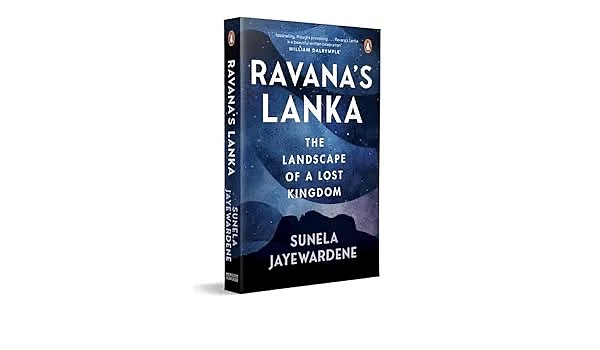
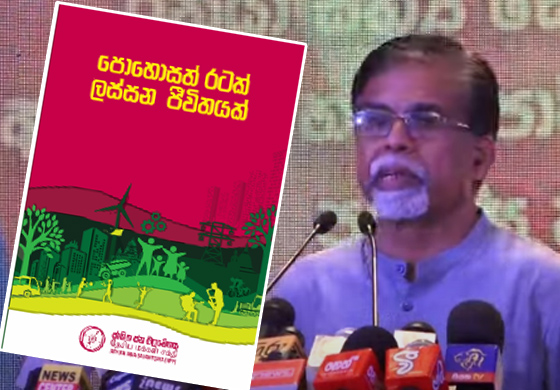 ජාතික ජනබලවේගයේ ප්රතිපත්ති ප්රකාශයේ 230 වෙනි පිටුවේ සත්ය සෙවීමේ කොමිසම තවත් බලගන්වා ක්රියාත්මක කරන බව සඳහන් කර ඇති බවද ඔවුන් එසේ පවසන්නේ කෙසේදැයි සිතාගත නොහැකි බවද දේශහිතෛෂී ජාතික ව්යාපාරයේ මහ ලේකම් වෛද්ය වසන්ත බණ්ඩාර මහතා පවසයි.
ජාතික ජනබලවේගයේ ප්රතිපත්ති ප්රකාශයේ 230 වෙනි පිටුවේ සත්ය සෙවීමේ කොමිසම තවත් බලගන්වා ක්රියාත්මක කරන බව සඳහන් කර ඇති බවද ඔවුන් එසේ පවසන්නේ කෙසේදැයි සිතාගත නොහැකි බවද දේශහිතෛෂී ජාතික ව්යාපාරයේ මහ ලේකම් වෛද්ය වසන්ත බණ්ඩාර මහතා පවසයි. 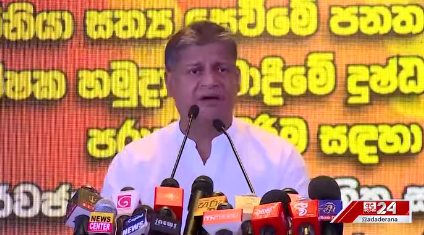 සත්ය සෙවීමේ කොමිසම පිහිටුවීමට ඔන්න මෙන්න කියා තිබිය දී ජනාධිපති අපේක්ෂකයක් වීමට තමන්ට ලැබීම ජාතියෙන් තමන්ට හිමිවූ වගකීමක් බව සර්වජන බලය ජනාධිපති අපේක්ෂක මව්බිම ජනතා පක්ෂයේ නායක දිලිත් ජයවීර මහතා පවසයි.
සත්ය සෙවීමේ කොමිසම පිහිටුවීමට ඔන්න මෙන්න කියා තිබිය දී ජනාධිපති අපේක්ෂකයක් වීමට තමන්ට ලැබීම ජාතියෙන් තමන්ට හිමිවූ වගකීමක් බව සර්වජන බලය ජනාධිපති අපේක්ෂක මව්බිම ජනතා පක්ෂයේ නායක දිලිත් ජයවීර මහතා පවසයි.